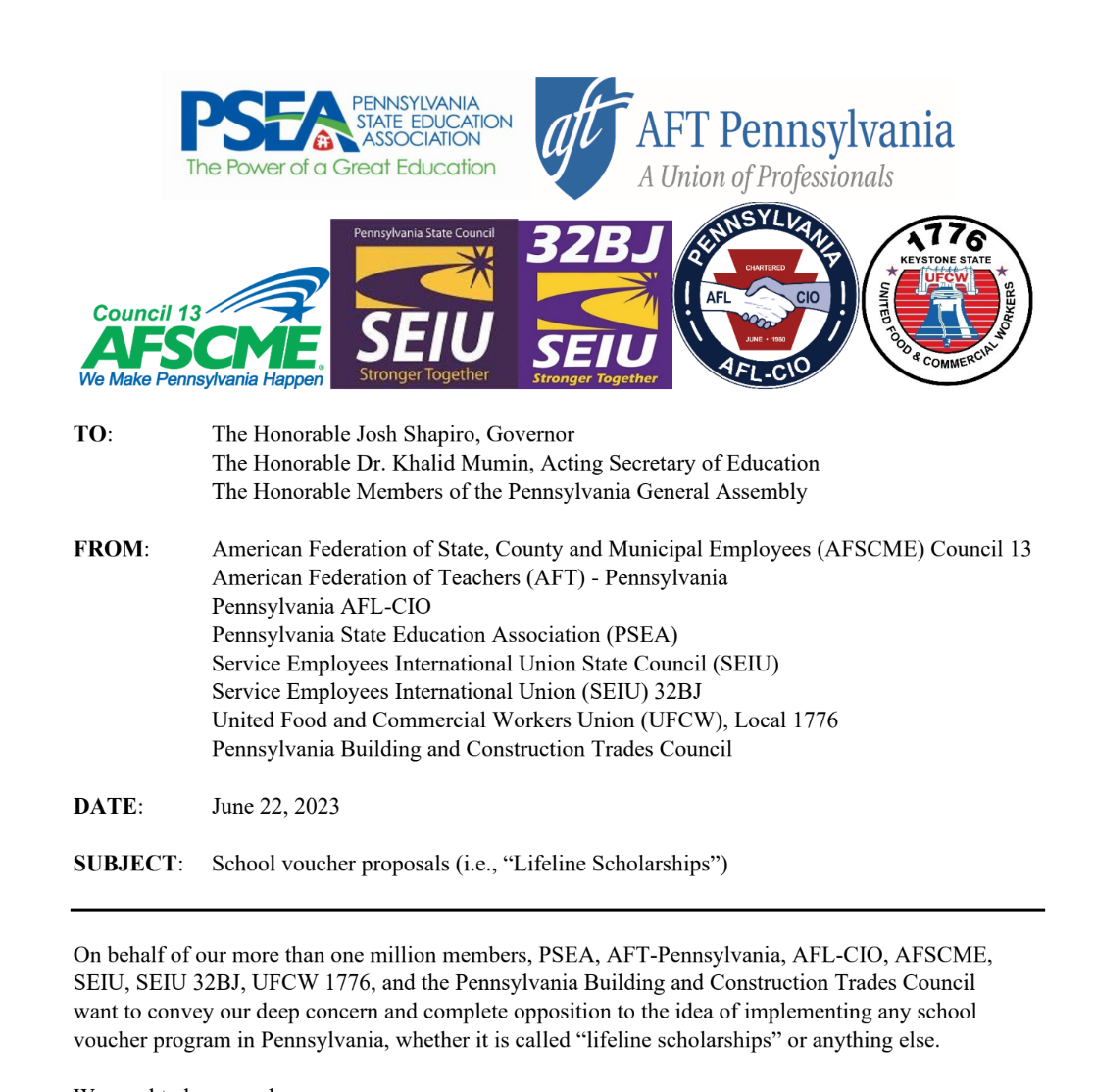ALL RESOURCES
FILTER BY TAG
Select a tag
- Academic performance
- Accessibility
- Accountability
- Advocacy
- Advocates
- Article
- Bill analysis
- Bill tracker
- Billionaires
- Blog post
- Civil rights
- Coalition building
- Community Schools
- Cost impact analysis
- Dark Money
- Data
- Disability
- Discrimination
- Drain funds from public education
- Education Savings Account (ESA)
- English language learners
- Fact sheet
- Fraud Waste and Abuse
- Graphic
- History
- Indigenous and Native Education
- Integration
- LGBTQ+
- Legislation
- Letter
- Litigation
- Messaging or talking points
- Model legislation
- National Voucher
- News
- Parents
- Personal narrative
- Podcast
- Policy brief
- Policymakers
- Radio
- Referendum
- Religion
- Report
- Rural communities
- Segregation
- Separation of church and state
- Slide deck
- Slides
- State Constitutional Right to Education
FILTER BY AUTHOR
Select an author
- Aaron Sanderford
- Alec MacGillis
- Allen Pratt
- Associated Press
- Bob Peterson
- Bruce Schreiner
- Catherine Caruso
- David Montgomery
- David Pepper
- Eli Hager
- Emily Walkenhorst
- Ethan Dewitt
- Geoff Mulvihill
- Hilary Wething
- Howard Fischer
- Jason Bailey
- Jessica Corbett
- Jim Collier
- Joe Dana
- Joshua Cowen
- Juan Perez Jr.
- Kiera Butler
- Laura Pappano
- Liam Amick
- Maurice Cunnningham
- Nora De La Cour
- Paige Masten
- Patrick Darrington
- Paul Hammel
- Phil Williams
- Rob Boston
- Robert Huber
- Rowan Moore Geretsy
- Sasha Pudelski

Advancement Project National Private School Voucher Program Opposition Letter May 30 2025
On behalf of Advancement Project and 139 national, state, and grassroots racial justice, education justice, and other civil rights organizations, we write urging you to oppose any effort to authorize or create a national private school voucher program.

Public school supporters surpass signature goalto put repeal of LB1402 voucher scheme on the November ballot
The Support Our Schools Nebraska coalition needed to collect 61,621 signatures to let voters repeal or retain a bill that spends millions of public tax dollars to pay for private schools. Today, the coalition submitted more than 86,000 signatures to the Nebraska Secretary of State to ensure the issue will appear on the November ballot. The group also exceeded the 38-county requirement with 5% of voters signing the petition in more than 60 of the state’s 93 counties.

NJ A4144/S3035 is a Private School Voucher Bill and it is Extremely Dangerous
Make no mistake – this bill would create New Jersey’s first and only PRIVATE SCHOOL VOUCHER program. Do not be fooled by code words like “scholarships” and “student support organization” and “tax credits.” As one court put it when striking down a similar tax credit voucher law, the program’s unconstitutionality could not be “evaded through the mechanism of funding this program from a tax credit rather than by a direct appropriation of tax dollars.”

Open Letter Against NJ Voucher Bill
Make no mistake – this bill would create New Jersey’s first and only PRIVATE SCHOOL VOUCHER program. Do not be fooled by code words like “scholarships” and “student support organization” and “tax credits.” As one court put it when striking down a similar tax credit voucher law, the program’s unconstitutionality could not be “evaded through the mechanism of funding this program from a tax credit rather than by a direct appropriation of tax dollars.”

Tell your legislator it's "game over" for Illinois' voucher program!
Illinois Families for Public Schools is calling for the Invest in Kids program to end permanently, along with more than 50 other state and local organizations. Vouchers harm the public good in a variety of ways: they violate the fundamental principle of the separation of church and state. They divert public dollars from our already underfunded Illinois public schools. Research shows that they do not improve academic outcomes for children who receive vouchers. And we know that voucher schools in Illinois are discriminating on the basis of religion, disability status, LGBTQ+ status and more---that's not what education equity looks like!

Tell NC Lawmakers: Time to Deliver the Funding Our Children are Owed!
While the Leandro plan remains unfunded, legislators are proposing another round of income tax cuts for the wealthy and a massive expansion of the current private school voucher programs. These programs will disproportionately benefit wealthy families while hampering opportunities for families living in poverty.

Florida Department of Education Data Request
This letter from the Florida Policy Institute and partners calls on the Florida Department of Education (FLDOE) and its scholarship funding organizations (SFOs), Step Up For Students and AAA Scholarship Foundation, to provide more information on students who have applied and been approved for Florida’s Tax Credit (FTC) Scholarships, Family Empowerment Scholarships – Educational Options (FES-EO), and Family Empowerment Scholarships for students with Unique Abilities (FES-UA).

Letter to IRS on Section 1001 Regulation in 2023-2024 Priority Guidance Plan
The National Education Association and partners wrote a letter urging that the IRS return to the work it left unfinished in 2019 when it issued final regulations on “Contributions in Exchange for State or Local Tax Credits” (RIN: 1545-BO89). Specifically, they suggest that the IRS issue a regulation clarifying the following:
A contribution of property in exchange for a 100 percent tax credit should be treated as equivalent to a sale at market value (“other disposition of property” under IRC section 1001) and the taxpayer should either owe tax on the portion of that sale that represents a gain, or recognize a loss if appropriate. When the contribution is made in exchange for a tax credit worth less than 100 percent of the amount donated, the transaction should be treated as part gift and part sale.

Joint Letter re “Lifeline Scholarship” Proposal
The Education Law Center-PA, PSEA, AFT-Pennsylvania, AFL-CIO, AFSCME, SEIU, SEIU 32BJ, UFCW 1776, and the Pennsylvania Building and Construction Trades Council on behalf of their members wrote a letter to the Shapiro administration conveying deep concern and complete opposition to the idea of implementing any school voucher program in Pennsylvania, whether it is called “lifeline scholarships” or anything else

Letter re SB 795 Private School Vouchers
The Education Law Center-PA wrote this letter urging the senate to reject SB 795. Funding private schools with public dollars, as this bill proposes, will not move the Commonwealth a single dollar closer to its constitutional mandate, which is to support and maintain a contemporary, effective public education system accessible to every child in the Commonwealth, regardless of their school district’s local wealth. In fact, it does the opposite, redirecting funds away from public schools and making compliance with the court ruling harder to achieve.
